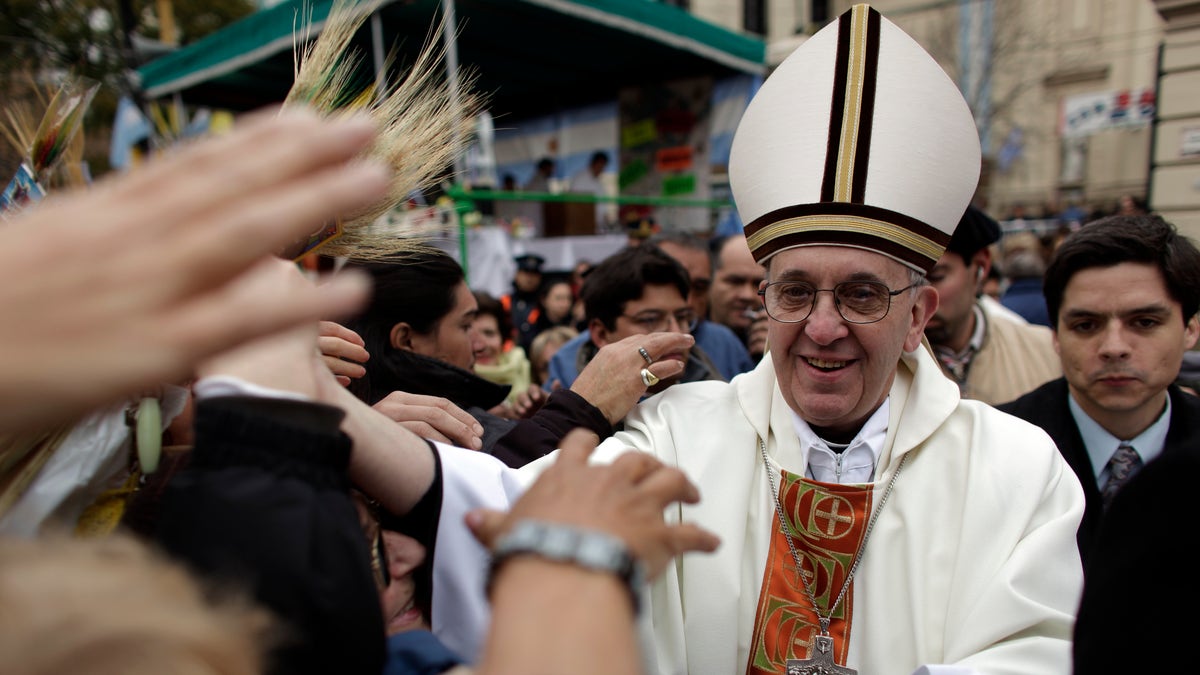
This Aug. 7, 2009 file photo shows Argentina's Cardinal Jorge Bergoglio, right, giving a mass outside San Cayetano church in Buenos Aires. Bergoglio, who took the name of Pope Francis, was elected on Wednesday, March 13, 2013 the 266th pontiff of the Roman Catholic Church. (AP Photo/Natacha Pisarenko, files) (AP2009)
Being Latino and Catholic, I was ecstatic at the choice of the archbishop of Buenos Aires, Cardinal Jorge Mario Bergoglio, as the new spiritual leader of the Roman Catholic Church. Having attended a Jesuit high school and college, I was also thrilled to see the Church elect its first Jesuit Pope. It was like watching your favorite teacher suddenly thrust onto the world stage. I felt like I knew this man, even though I had never met him.
What should we expect from the first Latin American and the first Jesuit leading the Catholic Church? Certain clues are already staring to emerge and other inferences can be garnered from his background, education and experience.
Given news reports of Bergoglio’s humility and disdain for worldly trappings, his selection of the name of Saint Francis is a clear sign that as pope he will remain a humble servant of Jesus Christ.
The newly elected pope chose the name of Saint Francis of Assisi to signify his papacy. This is remarkable because he chose the name of the founder of the Franciscan Order over that of one of the founders of his own religious community, the Society of Jesus. No pope has ever before called himself Francis. It is especially meaningful because St. Francis is perhaps the most revered saint in the history of the Church.
Francis was born in 12th century Italy of wealthy parents and eventually became a soldier. However, he renounced both wealth and soldiering to lead a life of monastic poverty and intense spirituality. Francis had a mystical vision of Jesus who implored him to “go and repair My house, which is falling into ruin.” He spent the rest of his life living as a poor but joyous monk, preaching the Gospel throughout the Mediterranean and into the Holy Land.
Given news reports of Bergoglio’s similar humility and disdain for worldly trappings, his selection of the name of Saint Francis is a clear sign that as pope he will remain a humble servant of Jesus Christ, following in His footsteps and tending to His church. This does not bode well for the entrenched Vatican curia, the Vatican bank, and other individuals and institutions not similarly focused on attending to the spiritual needs and welfare of the faithful, especially the poor.
Then there is the matter of Bergoglio’s Jesuit background and education. Within the Catholic Church, the Jesuits are considered the premier educators and their missionaries are seen as the Church’s expeditionary force (some jokingly refer to them as God’s Marines). Their spiritual and educational training is intense and many serve in harsh and dangerous places. Hundreds of prestigious schools and universities are run by Jesuits throughout the world. Bergoglio was forged in the same Jesuit crucible that produces such brilliant and disciplined priests. He is tough and smart.
The Jesuits are also known for their emphasis on social justice, sometimes taken to an extreme with the “liberation theology” preached by many left-wing Jesuits in Central and South America in the late 20th century. This led to confrontations with military regimes in the region, including in the new pontiff’s home country of Argentina.
Cardinal Bergoglio, now Pope Francis, never aligned himself with the leftist Jesuits. He refused to adopt their confrontational style and their support for socialism and revolution. This led to criticism and disdain from many Jesuits who felt he had betrayed his fellow priests who clashed, and often died, at the hands of the region’s tyrants. Given this history, the new pope is clearly a conservative, rejecting radical ideologies as a means to effect social or political change.
Bergoglio has however, openly criticized Argentina’s current political leaders over their endorsement of abortion, contraception and same sex marriage, all of which are considered contrary to the teachings of the Church. At the same time he has cared for HIV patients, the poor, unwed mothers and drug addicts. He has denounced those who shun them.
In short, Bergoglio is his own man. He is steadfast in his Catholic beliefs and will not alter its traditional doctrines. He speaks his mind openly and forcefully but is more focused on God than on worldly matters. The newly elected pontiff sees the face of Jesus in those who are most in need of help and spiritual guidance. He is more likely to shepherd his flock than to scold it.
Finally, Bergoglio comes from humble roots (his father was a railroad worker) and grew up in Argentina. Argentina, like many Latin American countries, is a study in contrasts. It is blessed with abundant natural resources and wonderful people. Unfortunately it has been hindered by income and social inequalities and by political leaders who have exploited those rifts to gain power, wealth and fame. Poverty remains a serious issue and disastrous government policies have led to a roller coaster of boom-bust economic cycles.
Thus the new spiritual leader of 1.2 billion Catholics is acutely aware of the problems and the opportunities of the emerging world, particularly in Latin America. Pope Francis will lead and inspire his faithful followers with the same humility and tenacity that allowed the son of poor Italian immigrants to rise and become the vicar of Christ, the visible head of the Catholic Church, on earth. He will inspire all of us, no matter what our faith, to be more caring and loving and to build a better tomorrow.
